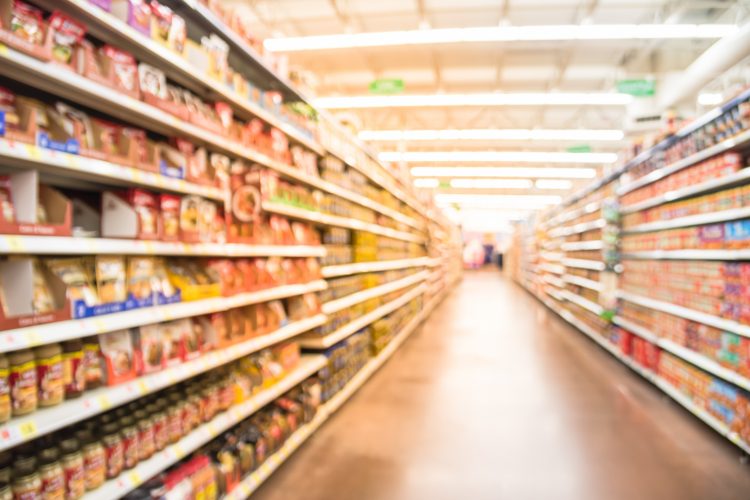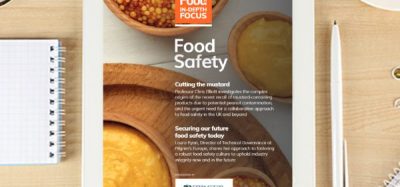“No need to panic,” says FDA
- Like
- Digg
- Del
- Tumblr
- VKontakte
- Buffer
- Love This
- Odnoklassniki
- Meneame
- Blogger
- Amazon
- Yahoo Mail
- Gmail
- AOL
- Newsvine
- HackerNews
- Evernote
- MySpace
- Mail.ru
- Viadeo
- Line
- Comments
- Yummly
- SMS
- Viber
- Telegram
- Subscribe
- Skype
- Facebook Messenger
- Kakao
- LiveJournal
- Yammer
- Edgar
- Fintel
- Mix
- Instapaper
- Copy Link
Posted: 2 April 2020 | Bethan Grylls (New Food) | No comments yet
Against a backdrop of empty supermarket shelves and worldwide concern over food supplies during the COVID-19 outbreak, the FDA offers reassurance on US food safety and its supply chain.


On 2 March 2020, New Food’s Editor was invited to a briefing delivered by Frank Yiannas, Deputy Commissioner for Food Policy and Response of the US Food and Drug Administration (FDA), where he offered assurance on US food safety and its supply chain for people and animals during the COVID-19 outbreak.
“This is a new frontier for all of us,” Yiannas said. “Let me assure you that the FDA is committed to protecting the health of the American people. We will ensure that our supply chain – from farm to fork – is not interrupted.”
US food supply chain
Presently, he stated there are no US food shortages, despite some reports suggesting otherwise. The empty shelves in supermarkets are largely a result of “unprecedented demand, rather than a lack of capacity in the supply chain”.
He added that the industry is “working around the clock to replenish stock” and that the retailers he has spoken to have said “supply chains remain strong”.
He continued, “Our supply chain is great, but it was not expecting this (demand), but it is resilient, and (industry) is working hard. Over the next couple of weeks, we’ll see shelves replenished.”
Consumers have “no need to panic. Buy what you need and leave some for others.”
Yiannas also reassured that “the US food supply chain remains safe for both people and animals,” adding that there is currently no evidence which suggests the novel coronavirus, COVID-19, can be transmitted via the ingestion of foodstuffs.
He added that this means food products should not have to be recalled if someone in the industry (for example, a manufacturing plant, supermarket worker etc.) has been confirmed as COVID-19 positive.
Packaging and sanitation
Although it is possible for the virus to survive on surfaces such as packaging, he emphasised this is not a “common mode of transmission”.
He said, “I would say that while there have been studies on the survivability of the virus on certain materials, we don’t believe it survives for a long time.
“It is a respiratory virus and therefore, is mostly transmitted person-to-person.”
He continued, “I do not personally sanitise my food packaging from the supermarket, but if you feel so inclined, you can wipe packages with antibacterial wipes and dry it off.”
He noted that hand washing is the best method of protection.
Shortages
Currently across Europe, there have been concerns over whether certain commodities will be in short supply. In the UK, for example, experts have warned that fresh fruit and vegetables may be difficult to source due to reliance on countries such as Italy and Spain which have been badly impacted by the pandemic.


Frank Yiannas
According to Yiannas, 15 percent of what Americans eat are imports. “There may be some hiccups in the supply,” he said, but the US is not foreseeing a lack of fruit and vegetables in its hemisphere. Shortages are instead in paper supplies, sanitation products, tinned food and eggs.
He explained that the FDA is working hard to redirect eggs that were destined for food service to retail. He hopes “that might provide a little bit of relief”.
Despite his overall confidence in the supply chain, he added that the FDA is monitoring the chain closely to see if there will be any long-term implications.
He urged that the focus must be on practising the measures government has advised – stay at home, wash your hands. He is hopeful that if this is followed by everyone, the supply chains will rebound relatively quickly.
Routine inspections and other duties
“The FDA staffs appears to be well and healthy by in large,” Yiannas reported, and the organisation is operating as usual, although routine food inspections have had to be postponed due to lockdown. Yiannas said that urgent inspections are still being responded to. In the meantime, guidance on how to comply with regulations is available on the FDA website. The FDA is also investigating alternatives such as remote inspection. However, Yiannas said he does believe that in the face of this crisis, industry will be “doubling its (safety and hygiene) efforts”.
The FDA’s mission is to ensure that food is safe, this does not usually include monitoring supply chains, Yiannas explained, but “we find ourselves in an unprecedented situation”. As such, he explained the FDA is working with an array of partners, with each using their particular area of expertise to ensure that the industry continues operating as smoothly as possible and the nation (and its pets) are kept fed.
“Where we can make adjustments we will,” he stated, pointing to the recent and temporary policy the FDA issued, which allows US food produced and destined for restaurants, and not labelled in accordance with retail compliance, to be diverted to retailers. This should help reduce food wastage and enable supermarkets to keep up with the surge in demand.
Yiannas concluded: “I want to give a personal shout-out to farms, workhouses, truckers, local grocery stores – on behalf of the FDA we salute you. You are everyday heroes.”
Related topics
Beverages, COVID-19, Food Safety, Ingredients, Packaging & Labelling, recalls, Regulation & Legislation, retail, Sanitation, Shelf life, Supermarket, Supply chain, The consumer, Trade & Economy









